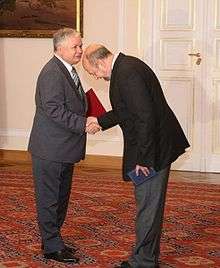Ryszard Legutko
| Ryszard Legutko | |
|---|---|
|
Ryszard Legutko (Kielce, 25 February 2014) | |
| Minister of Education of Poland | |
|
In office 13 August 2007 – 16 November 2007 | |
| Preceded by | Roman Giertych |
| Succeeded by | Katarzyna Hall |
| Member of the European Parliament for Lesser Poland and Świętokrzyskie | |
|
Assumed office 1 July 2014 | |
| Member of the European Parliament for Lower Silesian and Opole | |
|
In office 14 July 2009 – 2 July 2014 | |
| Personal details | |
| Born |
December 24, 1949 Kraków, Poland |
| Nationality | Polish |
| Political party | Law and Justice |
| Children | 2 |
| Alma mater | Jagiellonian University |
| Occupation | Politician, philosopher |
| Religion | Roman Catholicism |
| Signature |
 |
| Website |
www |
Ryszard Antoni Legutko (Polish pronunciation: [ˈrɨʂart anˈtɔɲi lɛˈɡutkɔ]), born 24 December 1949, is a Polish philosopher and politician. Professor of philosophy at the Jagellonian University in Kraków, specializing in ancient philosophy and political theory.[1]
Under communism he was one of the editors of the samizdat quarterly “Arka”. After the collapse of the communist regime he co-founded the Centre for Political Thought, which combines research, teaching, seminars and conferences and is also a publishing house.[2] He has translated and written commentaries to Plato’s Phaedo (1995), Euthyphro (1998) and Apology (2003). He is the author of several books: Plato’s Critique of Democracy (1990), Toleration (1997), A Treatise on Liberty (2007) and An Essay on the Polish Soul (2008), Socrates (2013).
In 2005 he was elected to a seat in the Polish Senate (representing the Law and Justice Party), where he became Deputy Speaker. In 2007 he was Poland’s Education Minister, and in 2007-2009 Secretary of State in the Chancellery of President Lech Kaczyński. He is currently a member of the European Parliament, where he sits on the Foreign Affairs Committee, and Deputy Chairman of the Conservatives and Reformists parliamentary group.
Sued in 2010 for violation of personal rights by calling students who demanded removal of Christian symbols from a public school “unruly brats spoiled by their parents”, he asked for a dismissal of the case based on his immunity as a member of European Parliament. In 2011 the court denied that request.[3] Plaintiffs are represented by an attorney on a pro-bono basis under the Precedential Cases Program of the Helsinki Foundation for Human Rights.[4]
Fellow of Collegium Invisibile as a professor of philosophy.[5]
References
- ↑ "Institute of Philosophy, Jagiellonian University". uj.edu.pl. Retrieved 5 November 2011.
- ↑ "Ośrodek Myśli Politycznej (Center for Political Thought)". omp.org.pl. Retrieved 5 November 2011.
- ↑ http://www.gazetawroclawska.pl/stronaglowna/333263,wroc-aw-legutko-odpowie-przed-s-dem-za-smarkaczy,id,t.html
- ↑ http://www.ns-adwokaci.pl/pro-bono-en.html
- ↑ "List of Fellows". ci.edu.pl. Retrieved 25 April 2011.
External links
 Media related to Ryszard Legutko at Wikimedia Commons
Media related to Ryszard Legutko at Wikimedia Commons- (Polish) Official homepage



